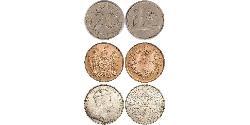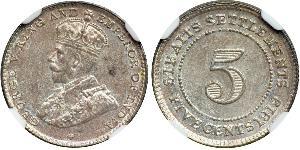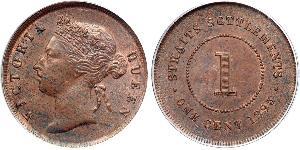1 Dollar Straits Settlements (1826 - 1946) Silver Edward VII (184 ...
Metal:
Issue year(s):
1907-1909
Person:
1907, Straits Settlements, Edward VII. Silver Colonial Trade Dollar Coin.
Issued for the British territories in Southeast Asia.
Mint year: 1907
References: KM-26.
Denomination: Dollar (Trade Dollar)
Mint Place: Heaton’s mint (Birmingham, UK)
Condition: Scattered circulation marks, otherwise a ncie XF!
Composition: Silver (.900)
Diameter: 34.2mm
Weight: 20.19gm
Obverse: Crowned head of Edward VII as King and Emperor, wearing Order of the Garter chain right. Mint initial (H) below.
Legend: EDWARD VII KING AND EMPEROR / H
Reverse: Ornate floral cross-like pattern with Chinese characters showing Chinese and Malay denomination.
Legend: STRAITS SETTLEMENTS – ONE DOLLAR 1907.
The Straits Settlements were a group of British territories located in Southeast Asia. Originally established in 1826 as part of the territories controlled by the British East India Company, the Straits Settlements came under direct British control as a crown colony on April 1, 1867. The colony was dissolved as part of the British reorganisation of its South-East Asian dependencies following the end of the Second World War. The Straits Settlements consisted of the individual settlements of Malacca, Penang (also known as Prince of Wales Island), and Singapore, as well as (from 1907) Labuan. With the exception of Singapore, these territories now form a part of Malaysia.
Edward VII (Albert Edward; 9 November 1841 â€" 6 May 1910) was King of the United Kingdom and the British Dominions and Emperor of India from 22 January 1901 until his death on 6 May 1910. He was the first British monarch of the House of Saxe-Coburg-Gotha, which was renamed the House of Windsor by his son, George V. Before his accession to the throne, Edward held the title of Prince of Wales and was heir apparent to the throne for longer than anyone else in history. During the long widowhood of his mother, Queen Victoria, he was largely excluded from political power and came to personify the fashionable, leisured elite. The Edwardian period, which covered Edward’s reign and was named after him, coincided with the start of a new century and heralded significant changes in technology and society, including powered flight and the rise of socialism and the Labour movement. Edward played a role in the modernisation of the British Home Fleet, the reform of the Army Medical Services, and the reorganisation of the British army after the Second Boer War. His work in fostering good relations between Great Britain and other European countries, especially France, for which he was popularly called “Peacemaker”, was unable to prevent the outbreak of World War I in 1914.
94
coins in the group
View all coins in the group
View all coins in the group
(2079 X 1050pixels, file size: ~479K)
Posted by: anonymous 2023-11-07
1908 Straits Settlements Dollar $1 - Certified NGC Uncirculated Detail (UNC MS)
(1737 X 851pixels, file size: ~383K)
Posted by: anonymous 2021-03-31
CoinWorldTV 1903, Straits Settlements (British Colony). Silver Trade Dollar Coin. Chopmarks! Mint Year: 1903 Mint Place: Bombay (B) Denomination: Dollar (Trade Dollar) References: Davenport 303, KM-25. Condition: Two chopmarks in obverse, one in reverse, minor deposits, otherwise about ...
(1737 X 848pixels, file size: ~353K)
Posted by: anonymous 2021-03-31
CoinWorldTV 1907-H, Straits Settlements, Edward VII. Colonial Silver Trade Dollar Coin. aXF- Mint Year: 1907 References: KM-26. Denomination: Dollar (Trade Dollar) Mint Place: Heaton´s mint (Birmingham, UK) Condition: Minor tooling mark on edge (old silver-test marks), bag-marks, a few ...
(1737 X 841pixels, file size: ~367K)
Posted by: anonymous 2021-03-31
CoinWorldTV 1908, Straits Settlements, Edward VII. Colonial Silver Trade Dollar Coin. aXF! Mint Year: 1908 References: KM-26. Mint Place: Bombay (B) Denomination: Dollar (Trade Dollar) Condition: Scratches and hairlines, minor deposits in reverse, otherwise about XF! Composition: Silve ...
(740 X 370pixels, file size: ~70K)
Posted by: anonymous 2020-11-30
1908,British Colony. Edward VII Dollar 1908 MS62 NGC, KM26. HID05401242017.
(1537 X 737pixels, file size: ~264K)
Posted by: anonymous 2019-10-10
CoinWorldTV 1908, Straits Settlements, Edward VII. Colonial Silver Trade Dollar Coin. XF- Issued for the British territories in Southeast Asia. Mint year: 1908 References: KM-26. Mint Place: Bombay (B) Denomination: Dollar (Trade Dollar) Condition: Minor deposits, nuberous bag-marks ...
Related online coin collections

spa1 » Malaysian coins (20 coins)
I had a business trip to Malaysia some time ago. It's a nice multicultural country where people speak really different languages (Malaysian, Chinese, Indian, English). That land has a rich history and was a part of various 'European Empires': Po ...

spa1 » Malaysian coins (20 coins)
I had a business trip to Malaysia some time ago. It's a nice multicultural country where people speak really different languages (Malaysian, Chinese, Indian, English). That land has a rich history and was a part of various 'European Empires': Po ...
Articles
|
You may be interested in following coins
2024-04-26
- Historical Coin Prices
2024-04-26
- New coin is added to 1\/2 Thaler
1\/2 Thaler
group has 2 coins / 1 prices
⇑
1791, Regensburg (Free City), Leopold II. Silver "City-View" 1/2 Thaler Coin. R! Mint year: 1791 Mintage: 1,446 pcs. Denomination: ½ Thaler Reference: KM-463. R! Mint Official: Geor ...
You may be interested in ...

-500-250-jkPBwcI0k1sAAAEo.vH7lK9V.jpg)
-300-150-LKMZtRD4yM4AAAGLz8zHuqrr.jpg)
-300-150-GfA22nImWYMAAAF4enIcj4bk.jpg)
-300-150-C2A22nIm5gsAAAF4zFwcj4bk.jpg)
-300-150-fE022nIm2NUAAAF4g0Ycj4bk.jpg)
-300-150-ag7JOsJM8WoAAAF2WSENKxdx.jpg)
-300-150-lJTIA5dcgZ4AAAFtTvnmNrRC.jpg)














